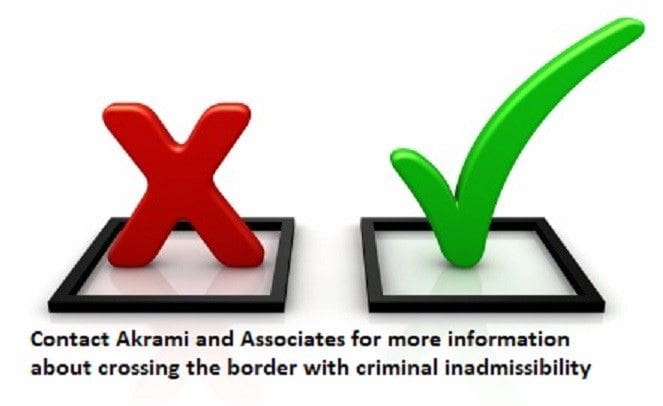How Can I Cross the Border Successfully
Important Don’ts When Crossing the Border with Criminal Inadmissibility
Any foreign national will experience some anxiety or fear when crossing the Canadian border, especially when the Immigration officer asks questions regarding your criminal inadmissibility. Foreign nationals who have criminal inadmissibility or, in other words, a criminal record will have more questions and more examination from the Immigration officer when attempting to cross the border. Therefore, as a criminally inadmissible foreign national, you should be well-prepared and anticipate all questions that the Immigration officer may have for you. You should know what to do at the Canadian border, which is explained in our article “Top 5 Dos When Crossing the Border with Criminal Inadmissibility.” In addition, you should know what not to do at the border. Therefore, in this article, I will explain the top don’ts when crossing the border with criminal inadmissibility.
Top 5 Don’ts When Crossing the Border with Criminal Inadmissibility
It is very important and essential for foreign nationals to know exactly what to expect when entering Canada, specifically through a Canadian border. It is also very important for foreign nationals to know what not to do at the Canadian border. Immigration officers at the border are very observant with who enters Canada, especially with inadmissibility. Therefore, in order for foreign nationals with inadmissibility to better prepare themselves before entering Canada, please read the following top 5 don’ts when crossing the border with criminal inadmissibility.
Don’t Be Disrespectful
When crossing the border, the Immigration officer will communicate with you in an authoritative manner and it may come across as mean or rude. Do not take this the wrong way. The Immigration officer needs to be stern with every individual who attempts to cross the border, especially with individuals who have criminal inadmissibility. They must ensure that these particular individuals do not pose a threat to Canadian citizens or residents. Therefore, you should not be rude or disrespectful in return as this can cause the Immigration officer to deny your entry into Canada.
Don’t Disclose More Than What is Asked
You can expect the Immigration officer to ask several questions with regards to your criminal inadmissibility. However, when answering their questions, it is best to keep it short and to the point. Do not disclose more information than what is asked as this can cause for more questions to be asked or for the Immigration officer to become suspicious. It is advisable to answer the questions respectfully and with the necessary information that is being requested. An example of this is if the Immigration officer decides to ask about your conviction and details of the day that it happened and you insist on explaining what you were doing that day and the activities you participated in, maybe you disclose similar occasions that have happened on different days; this is not what you should do. Answer what the Immigration officer is asking in a very precise manner without expanding and giving more information that might incriminate you further.
Don’t Have Too Many Things in Your Car
Immigration officers must be very observant and examine the details of an individual as well as their vehicle when they attempt to cross the Canadian border. As a result, if the Immigration officer observes something out of place or suspicious, they do have the authority to stop your vehicle and do a search. This is especially the case if you have multiple things in your car that may look like something that can be sold in Canada, for instance. Therefore, it is best not to have too many things in your car to avoid the Immigration officer from searching your car. If you do end up bringing a lot of things with you to Canada and the Immigration officer suspects you may be bringing something illegal, you can definitely be denied entry.
Don’t Lie About Your Criminal History or Record
When attempting to cross the Canadian border, it is best to be as straight forward and honest about your information, especially with regards to your criminal history or record. Immigration officers do have a database for citizens and residents from the United States and Canada; therefore, if you are an American citizen or permanent resident, it is best to be very honest with the officer. If you decide to lie or omit information about your criminal history or record to avoid more complications, this will actually do the opposite effect and will cause more complications and in the worst case scenario, your denied entry into Canada and possibly misrepresentation. Therefore, it is highly advisable to be honest and disclose any information that is requested with regards to your criminal history and criminal record.
Don’t Attempt To Cross Another Border On The Same Day
If you believe that you may have a stronger case at entering Canada through a different port of entry, since you were denied entry at one port of entry, this is definitely not the case. As aforementioned, Immigration officers have a database where they have all information on individuals who attempt to cross the border. Therefore, if you want to try and enter Canada from a different port of entry, this will not give you any more chances of entry into Canada. Quite the opposite can occur. If the Immigration officer discovers that you’re omitting information about your previous attempt to enter Canada, they will deny your entry into Canada and further consequences may ensue. Therefore, it is best to take it for what it is and just return to your country if you are denied entry. This does not mean you cannot attempt to cross the border in the future; just don’t attempt to enter Canada through multiple port of entries in one day.
Contact Akrami & Associates
It is essential that you have taken all of the previously mentioned suggestions and advice into consideration before you attempt to cross the Canadian border with criminal inadmissibility. Applications to overcome your criminal inadmissibility are difficult applications to pursue on your own and it is highly recommended that you seek out professional and experienced help before attempting to submit the application. Here, at Akrami & Associates, we work and have experience with many different immigration issues. We have helped many of our clients cross the Canadian border with criminal inadmissibility. If you believe that you may be eligible, please feel free to contact Akrami & Associates at our office at 416-477-2545 for more information or if you would like to book a consultation with an immigration professional for more advice.
With Akrami & Associates, there is always a way!
Latest Immigrations News

December 5, 2025
THE ULTIMATE GUIDE TO HUMANITARIAN & COMPASSIONATE (H&C) APPLICATIONS IN CANADA
THE ULTIMATE GUIDE TO HUMANITARIAN & COMPASSIONATE (H&C) APPLICATIONS IN CANADA Understanding When, Why, and How to Apply for Permanent Residence on Humanitarian Grounds What Is an H&C Application? A Humanitarian and Compassionate (H&C) application is a last-resort pathway for individuals who are in Canada and do not [...]

September 11, 2025
Canada Super Visa: Step-by-Step Guide for Parents and Grandparents
For many Canadian citizens and permanent residents, bringing parents or grandparents to Canada for extended visits is more than just a wish, it’s a heartfelt need. While most people first consider the traditional visitor visa, there is another option designed specifically for family reunification: Super Visa applications. [...]

August 23, 2025
Intra-Company Transfer (ICT) Work Permit, Your Complete Guide to Working in Canada
For multinational companies, moving key talent across borders is often essential for growth and operational success. The Intra-Company Transfer (ICT) Work Permit provides a streamlined pathway to bring experienced employees to Canada without the time-consuming Labour Market Impact Assessment (LMIA) process. For foreign professionals, it’s more than [...]

Book a Conslutation
One of our Representatives will
assist you with your matter. Book Now!
Click here

Call us for
more Information
+1-416-477-2545
Toll Free: 1-877-820-7121
Click here

Write Us (Online Form)
Complete our form and one of our
Representatives will contact you.
Click here
Subscribe To Our Newsletter





